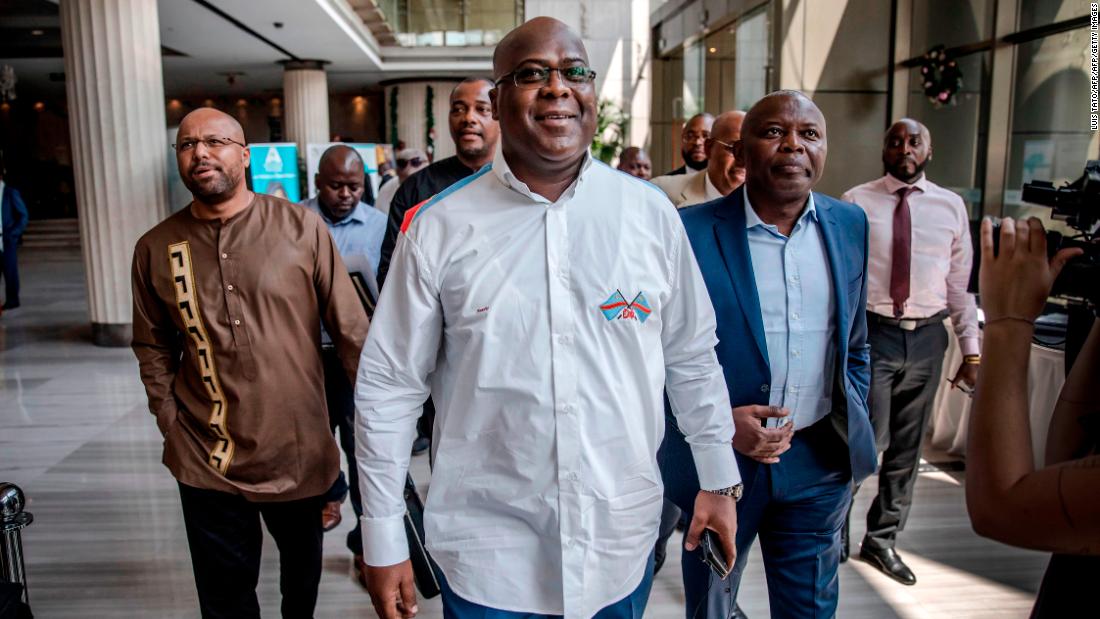TENSION IN KINSHASA OVER TSHISEKEDI'S VICTORY
BY ABDULMUMINI ADEKU.



For all of its chequered history,Congo Kinshasa formally
Zaire had always being at war.
When the time came for the polls nobody gave the opposition
parties a chance and even when the polls took place the results were not
announced in time thus leading to days of relentless campaigns for same.
At some point ,the Roman Catholic Church believed to make up
about 90 percent of the population of the nation had to voice out its concerns
to alert the General electoral body of its responsibilities to the people with
President Joseph Kabila believed to have told them to steer clear of partisan
politics
BIOGRAPHY IN RETROSPECTIVE
Félix Antoine Tshisekedi Tshilombo[1]
(French: [feligz ɑ̃twan tʃizək(ə)di
tʃilɔ̃bo]; born 13 June 1963)[2] is the leader of the Union for Democracy and Social Progress (UDPS),
the oldest and largest opposition party of the Democratic
Republic of the Congo.[3] As of 10 January 2019, he is the
President-elect of the DRC.[4] He is the son of the late Étienne Tshisekedi,
a three-time Prime Minister of Zaire and opposition leader,
and would therefore become the first Congolese president to be related to a
Prime Minister.
Early
life and education
Tshisekedi was born in Léopoldville on 13 June 1963 to mother Marthe and
father Étienne Tshisekedi,
who served as Prime Minister of Zaire in the 1990s. His father is of Luba ethnicity.[5] Félix had a comfortable life as a youth
in the capital. When his father created the UDPS in the early 1980's, publicly
opposing Mobutu, Félix was
forced to accompany his dissident father into house arrest in his native
village in central Kasaï. This led to him
ending his studies. In 1985, Mobutu authorised him, his mother, and his
brothers to leave Kasaï. He went on to live in Brussels, Belgium, where he worked at odd jobs, enjoyed the
night life, and became an active UDPS militant.[2]
Political
career
In late 2008, Tshisekedi was named
as the UDPS National Secretary for external relations.[6] In November 2011, he obtained a seat in
the National Assembly, representing the city of Mbuji Mayi in Kasai-Oriental province. He did not take his seat
citing a fraudulent election[citation needed]
and his mandate was invalidated for "absenteeism".[6]
In May 2013, he refused a position
of rapporteur at the Independent National Electoral Commission (CENI),
saying that he did not want to put his political career on hold[7] as CENI's article 17 excludes
membership for those who are members of a political formation.[6]
In October 2016, Tshisekedi became
vice secretary general of the UDPS.[6] On 31 March 2018, he was elected to
lead the UDPS, after his father's death on 1 February 2017.[8] The very same day, he was chosen by his
party to be the UDPS presidential candidate in the general election that took place on 30 December
2018.[1]
On 10 January 2019, it was announced
Tshisekedi had been elected President of the Democratic Republic of the Congo
in the elections held on 30 December 2018.[4] He defeated another opposition leader, Martin Fayulu, and Emmanuel Ramazani
Shadary, who was supported by term-limited outgoing president Joseph Kabila who has been president for eighteen
years. Fayulu, the runner-up, alleged rigging and challenged the election
results.[9]
References
1.
·
"Félix Tshisekedi investi candidat du parti historique
d'opposition UDPS en RDC". Voice of America (in French). 31 March 2018.
Retrieved 25 May 2018.
·
·
Boisselet, Pierre (15 June 2017). "RDC : Félix Tshisekedi, au nom du père".
Jeune Afrique (in French). Retrieved 26 May 2018.
·
·
Clowes, William (25 May 2018). "Congo Opposition Leaders Mull Unity Candidate for
Delayed Vote". Bloomberg News. Retrieved 25 May 2018.
·
·
Williame, Jean-Claude; et al. (1997). Zaire: Predicament and
Prospects. DIANE Publishing. p. 3. ISBN 0-7881-7042-2.
·
·
"Félix Tshisekedi Premier ministre à la place de Samy
Badibanga?". Politico.cd (in French). 23 December 2016.
Retrieved 25 May 2018.
·
·
« Je ne tiens pas à mettre ma carrière politique entre
parenthèses »
·
·
"Tshisekedi's son leads DRC's main opposition party".
The Herald. 2
April 2018. Retrieved 25 May 2018.
9.
· "Surprise Winner Of Congolese Election Is An Opposition
Leader". NPR.org. Retrieved 10 January 2019.
No comments:
Post a Comment